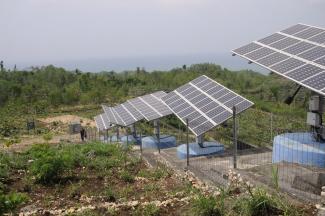Report
WBGU proposals

The WBGU’s starting points are that human dignity must not be violated and that the common good must be safeguarded. According to its latest study (see main story), the top priority must be to protect the natural foundations of life. In this context, digital technology should serve to charge prices for the use of natural resources and ecosystem services. In the eyes of the government-appointed Council, those who damage or deplete the environment must pay commensurate taxes and fees.
The WBGU also sees scope for digitalisation driving decarbonisation and climate protection in the energy sector. Resource efficiency and the transition to renewables are considered essential. Electronic devices, moreover, must be easy to repair and should last for a long time. The scholars point out that this would serve the principal of recycling. In agriculture, digital applications could reduce the use of pesticides and fertilisers. Other apps could serve awareness raising for environmental issues, the study recommends.
Another WBGU proposal is to apply digital technology to fighting poverty and boosting inclusiveness. Development policies should be geared to building digital sustainability. Once more, climate protection and resource efficiency are priorities. Capacities must be built to fully tap the potential of technology, and the WBGU is in favour of close cooperation with emerging markets. Goals would include better dialogue, increasing research cooperation and more effective global governance.
The WBGU points out that digital change requires an adequate analog foundation. In developing countries, they see the need to strengthen that foundation. Relevant issues include the expansion of infrastructure in general and education in particular. The WBGU demands that the digital divide between disadvantaged and privileged countries must be closed. Developmental and humanitarian efforts should benefit from digital technology, however, for example in disease control in times of epidemics.
Municipal governance matters very much in the eyes of the WBGU. Local governments must be in the driver’s seat, for instance, to ensure sustainable transportation.
The future of work and the reduction of inequality are further issues that the experts tackle. They predict that workplaces and labour markets will change dramatically, and they want action to be taken in response. It would make sense to reform tax systems. Income and payroll taxes could be reduced, if resource use and environmental harm were taxed properly, they argue. More generally, the WBGU insists that workers’ social protection and occupational safety remain indispensable in the digital era.
The authors appreciate innovative approaches to redistributing incomes and profits in ways that reduce inequality. The universal basic income for all citizens is mentioned favourably, and so is giving staff a direct share of company profits. The challenge is to draft good policies, the WBGU states. Activities that protect the environment and boost social inclusion should be encouraged, and that applies to relevant volunteering as well.
The WBGU study emphasises the relevance of education, which should be geared towards digital citizenship. The authors propose adopting a new social contract. According to them, spending on education must count as a serious investment. In practical terms, they want schools and universities to become better funded, teachers to become better trained and curricula better geared to tackling digital topics.
The authors spell out that big data and privacy deserve attention. Governments should ensure that citizens’ data is not abused. The WBGU study proposes negotiating a UN convention on data protection. Such a convention should cover algorithms that benefit from huge databases (big data). Regulations are needed to prevent crime, manipulation and misuse moreover.
Given that the current setting of global governance does not offer a platform to negotiate these matters, the WBGU suggests that a UN summit on sustainability in the digital age should be convened soon. Goals would include adopting a charter and mainstreaming digitalisation issues within the UN system. (sb)













